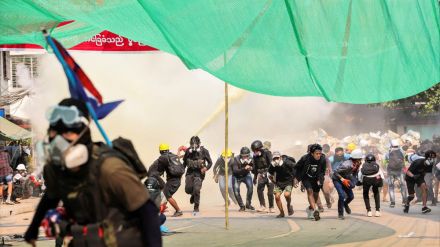The United Nation’s leading human rights body on Thursday (April 4) sounded the alarm over Myanmar’s worsening conflict, describing it as the most severe violence since the military seized power in 2021. Assistant Secretary-General for political affairs Khaled Khiari highlighted the dire situation in front of the UN Security Council and said civilian toll is rising due to indiscriminate bombing and artillery shelling by Myanmar’s armed forces.
The Human Rights Council, consisting of 47 member nations, unanimously supported a resolution urging governments to refrain from exporting or selling jet fuel to Myanmar. This measure aims to prevent the ruling military junta in Myanmar from potentially using the fuel to violate human rights in the conflict-ridden nation. Additionally, the council called for an end to the illicit transfer of weapons, munitions, and other military equipment to Myanmar.
Escalating violence in Myanmar
The conflict in Myanmar erupted after the military ousted the elected government of Aung San Suu Kyi and suppressed widespread protests calling for a return to democracy. Thousands of young people fled to remote border areas, joining ethnic guerrilla forces in their fight for autonomy. Despite the military’s overwhelming advantage, it has struggled to quell the resistance, facing defeats in various regions.
In a latest development, Myanmar’s main pro-democracy resistance group launched drone attacks on the capital’s airport and military headquarters, in Naypyitaw. While the military claimed to have destroyed the drones, the incident underscores its weakening control.
Khiari also highlighted the intensifying conflict between the Arakan Army and the military in Rakhine State, where the situation has reached unprecedented levels of violence.
“The Arakan Army has reportedly gained territorial control over most of central Rakhine and seeks to expand to northern Rakhine” where many minority Rohingya Muslims still live, he said.
About 740,000 fled from Myanmar to refugee camps in Bangladesh when the military in August 2017 launched a brutal counterinsurgency campaign in response to attacks in Rakhine by a guerrilla group claiming to represent the Rohingya.
The rising violence in Myanmar continues to spill over the borders and added fuel to conflicts in key border areas have weakened security, Khiari highlighted. The crisis has not only displaced millions and left millions without enough food but has also facilitated the proliferation of illicit activities, including drug production and human trafficking.
“Myanmar has become a global epicentre of methamphetamine and opium production, along with a rapid expansion of global cyber-scam operations, particularly in border areas,” he said. “What began as a regional crime threat in Southeast Asia is now a rampant human trafficking and illicit trade crisis with global implications.”
“This is an important message from the U.N.’s main human rights body that business as usual is not acceptable when supplying jet fuel to those who use airstrikes to commit war crimes,” said Iniyan Ilango, Amnesty’s representative to the U.N. in Geneva.
International assistance to address humanitarian crisis
Senior UN humanitarian official Lisa Doughten stressed the urgent need for international assistance said the ongoing escalation has left 12.9 million people, almost 25% of the country’s population, without enough food – with children and pregnant women face malnutrition.
“Across Myanmar, the humanitarian community estimates that some 18.6 million people will need humanitarian assistance in 2024 — a nineteen-fold increase since February 2021,” she said. She also emphasised that the health system is also in turmoil, with medicines running out.
UN Secretary-General Antonio Guterres has called for a unified international response to the conflict, urging neighbouring countries, especially ASEAN members, to use their influence to end the violence and seek a political solution. However, Britain’s UN Ambassador Barbara Woodward noted the Myanmar military’s reluctance to engage meaningfully in peace efforts.
Meanwhile, Russia’s UN Ambassador Vassily Nebenzia objected to the meeting, dismissing Myanmar as a threat to international peace and security. He accused Western nations of exacerbating the crisis for their own geopolitical interests.
As Myanmar’s conflict continues to escalate, UN officials emphasize the importance of concerted efforts to alleviate the humanitarian crisis and resolve the underlying political tensions.
UN to investigate human rights violations in Iran
The council also voted 24-8, with 15 abstentions, to pass a resolution extending investigations into human rights violations in Iran for another year. These investigations will be conducted by two separate teams: one led by a “special rapporteur” examining the overall human rights situation, and another by a “fact-finding mission” focusing on rights violations related to protests since September 2022.
Members of the mission informed the council recently that Iran’s government bore responsibility for the “physical violence” resulting in the death of Mahsa Amini, a 22-year-old woman who passed away in a hospital after being arrested by the country’s morality police for allegedly not wearing her hijab according to authorities’ standards.
Amini’s death triggered widespread protests, and a security crackdown lasting months claimed the lives of over 500 individuals and led to the detention of more than 22,000 others.
(Witn inputs from Associated Press)
